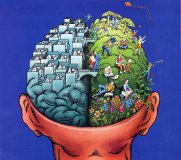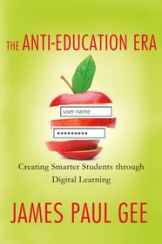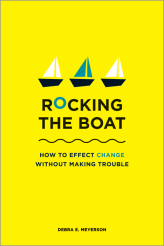 We all live in the utopia of our mind. Some of us are living in ignorant bliss and some of us are living in the terrifying world where we watch the movie Idiocracy come to life. James Paul Gee’s book, The Anti-Education Era: Creating Smarter Students through Digital Learning discusses why we make “stupid” decisions when our brains are so smart.
We all live in the utopia of our mind. Some of us are living in ignorant bliss and some of us are living in the terrifying world where we watch the movie Idiocracy come to life. James Paul Gee’s book, The Anti-Education Era: Creating Smarter Students through Digital Learning discusses why we make “stupid” decisions when our brains are so smart.
Education is under attack in Illinois and as an educator in the Chicago Public Schools, I have been sorting through the vitriol spewed out by people who find it easier to blame teachers than admit our political system is broken. In land of corrupt politics, teachers are the scapegoats. The evil ones sucking all of the money out of the system. Our governor is aiming to privatize the PUBLIC school system. At what point do we take a stand against this “stupidity” as Gee would refer.
Although it’s a difficult read (as it makes us confront our own responsibility in the need to educate the idiocratic) it answers some questions that made me think I was just being cranky and judgemental against the world. It also made me think back to when I read Debra Meyerson’s book, Rocking the boat: How to effect change without making trouble. In times of frustration a tempered radical, as Meyerson refers to agents of change, will look opposition in the eye. Gee posits our brain’s natural response is to take the path of least resistance and how we can overcome it.
You can’t flat out call someone stupid. I disagree with the use of the word and it is not a way to interact intellectually with others. Gee does not intend to use the word in a harmful way, but I try to ask my students to use more descriptive words and I should live by what teach. I’m interested to finish the book to see what additional tips Gee has to overcome our brain’s stupidity. For now, I will reflect on what I took away from Meyerson’s book and follow in Gandhi’s footsteps. View my essay reflecting on Part 1 of Gee’s book here.



“Be the change you want to see in the world” – Gandhi
References
Ajifo, A. (2014, July 7). Right brain [Digital image]. Retrieved January 24, 2016, from https://www.flickr.com/photos/125992663@N02/14414603887
Gee, J.P. (2013). The Anti-Education Era: Creating Smarter Students through Digital Learning. New York: Palgrave Macmillan.
Gee, J. P. (n.d.). [The Anti-Education Era Book Jacket Image]. Retrieved January 24, 2016, from http://us.macmillan.com/theantieducationera/jamespaulgee
Idiocracy. (n.d.). Retrieved January 24, 2016, from http://www.imdb.com/title/tt0387808/
Mahatma Gandhi [Digital image]. (2015, April 6). Retrieved January 24, 2016, from https://en.wikipedia.org/wiki/Gandhi_(surname)
Meyerson, D. (n.d.). [Rocking the Boat Book Jacket]. Retrieved January 24, 2016, from https://hbr.org/product/rocking-the-boat-how-to-effect-change-without-making-trouble/2138-PBK-ENG
Meyerson, D. E. (2008). Rocking the boat: How to effect change without making trouble. Boston: Harvard business Press.
Hi there!
I agree that calling everyone stupid is not a good idea. I do find it a little bit funny, though.
You are right. Being in the real-life version of the Hunger Games with your job always on the line must affect the way you do everything at school and all the choices you make. I see how you stress the importance of the primitive brain that looks for ways to live another day, to hold on to teaching.
Before I clicked on the link to your essay, I thought you would focus on Chapter 10 and the dangers of institutional thought. The way schools are run, teachers are evaluated, and students are tested was determined decades ago and does not necessarily mesh with the current political and social climate. But, even when we disagree, Gee says it is almost impossible for a single individual to make a difference. Maybe I need to read Rocking the Boat to get a different perspective. Thanks for giving me a new and interesting title to add to my reading list.
LikeLike